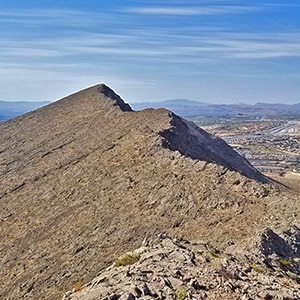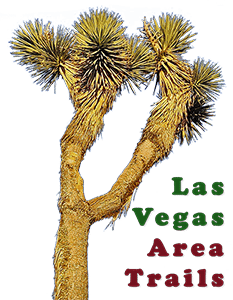Cheyenne Mountain, elevation 3833ft with an elevation gain of 900ft, is one of the many desert hills surrounding Las Vegas. Located in the Summerlin area, Cheyenne Mountain has a commanding view of Lone Mountain, the Las Vegas Valley and many surrounding high points.
The Toove Trail, a 4-mile loop trail, completely circles the base of Cheyenne Mountain. The Toove Trail is child-friendly and used by hikers, trail runners, mountain bikers, rock climbers scoping out summit approaches, people walking their dogs and families with children. If you can walk 4 miles, you can probably handle the Toove Trail.
The East side of Cheyenne Mountain is bordered by Cliff Shadows Parkway, and there are three Las Vegas Metro Area Parks along the road: Buckskin Park (just above – North of – I-215 Cheyenne Road exit), Trigono Hills Park, about 1/4th mile further up Cliff Shadows Parkway and, in about one more mile, Open Desert Park (take a left – West – off Cliff Shadows Parkway onto Alexander Road and continue about 1/8th mile to the end of that road). All of these parks serve as access points for the Toove Trail.
As you circle Cheyenne Mountain on the Toove Trail, you’ll notice potential summit approaches from class 3 to class 5 climbing skill levels (class 3 – you need to use your hands; class 5 – sheer cliff, ropes recommended).
The summit itself is a 1.5-mile-long slope with a 900ft altitude gain from its North end near Open Desert Park to its high summit South end at Buckskin Park. The summit ridge is rather rocky and narrow in places. I refer to it as The Razor’s Edge.
Views from the summit ridge are incredible including Lone Mountain, much of the Las Vegas Valley including the Las Vegas Strip, the Sheep Range, Fossil Ridge, Gass Peak, the Muddy Mountains, Sunrise Mountain, Frenchman Mountain, Mt. Wilson in Arizona, Summerlin Ridge, Blue Diamond Mountain, the Rainbow Mountains on the West side of Red Rock Park, Potosi Mountain, La Madre Mountain, Summerlin Ridge and much more.
It’s advised to explore Cheyenne Mountain from Fall to Spring or very early on a Summer morning as mid-day Summer temperatures can easily rise above 110 degrees.
Take I-215 North from Summerlin toward Centennial Hills. Exit at Cheyenne Ave. Turn left to cross over the freeway. Just beyond the freeway the name of the road changes to Cliff Shadows Parkway. Take the first left into Buckskin Park. It’s not well marked so you could easily miss it. It’s more a trailhead parking area than a park, and much of it is unpaved, so just look for a moderate sized parking area on your left almost immediately after crossing over highway 215.
Alternate trailheads can be found at Cliff Shadows Trigono Park on Cliff Shadows Parkway and Open Desert Park further up Cliff Shadows Parkway off the West end of Alexander Road.
On this day my plan was to begin at Buckskin Park, completely circle the base of Cheyenne Mountain and ascend to the summit ridge.
At Buckskin Park you are immediately confronted with a large drainage channel that at first seems to block access to the trail circling Cheyenne Mountain. However, there is an easy crossing near the base of the mountain, and you’ll soon find yourself on the Toove Trail which circles Cheyenne Mountain. I took a left on the Toove Trail and circled Cheyenne Mountain in a clockwise direction.
Buckskin Park is located below the summit of Cheyenne Mountain 900ft above, so looking up, you are confronted with a pretty steep cliff. Summit approaches on the South side of Cheyenne Mountain are class 5 due to the sheer cliff headwall immediately below the summit (see the slide show for summit approach views on all sides of Cheyenne Mountain).
Rounding the Southwest corner of the base of Cheyenne Mountain the view opens up to a Western valley crisscrossed with trails and a higher ridgeline on the opposite side. That high ridgeline is Summerlin Ridge with Summerlin Peak. The reason I mention these here is that the Toove Trail and Cheyenne Mountain ridge give an excellent perspective for scoping out potential summit approaches on the Eastern side of Summerlin Ridge.
The West side of Summerlin Ridge, accessed from the upper end of Lake Mead Blvd., is mostly guarded by sheer cliffs which are curiously shaped like smaller versions of La Madre Mountain, El Padre Mountain and Burnt Peak, thus my nickname for these features: Little La Madre, Little El Padre and Little Burnt Peak. The slope along the East side of Summerlin Ridge, viewed from the Toove Trail, is more gradual than the cliffs on the West side, so on this day I noticed a number of potential Eastern approaches to the summit area of Summerlin Ridge (see the video and slide show on this page).
Continuing around the West side of Cheyenne Mountain, though there were mostly cliffs, I noticed a couple potential class 3 approaches to the summit of the Cheyenne Mountain ridgeline. As I neared the Northwestern edge of Cheyenne Mountain, there was a fairly well-traveled split-off trail that headed for the summit ridge. I took this trail, winding my way up to the summit ridge. At the base of the ridge in a cliffy area, there was a small overhang camping area which looked like a great place to spend an evening watching the sunset and the stars as night deepened.
The summit of Cheyenne Mountain Ridge is rocky and narrow in places. There is a high point on the mid-summit ridge with a summit box. From there one can see another quarter mile of ridge continuing South to the higher Southern summit. That section of ridge is very narrow in places with some exposure.
I returned North, down the ridge, to the point I had first summited the ridge. From there, I took a class 2-3 slope down to the Eastern side of Cheyenne Mountain landing on the Toove Trail just North of Trigono Park. Continuing to circle Cheyenne Mountain Southward on the Toove Trail I noticed a number of more gradual slopes, potentially class 3, ascending to the Southern summit of Cheyenne Mountain. Passing Trigono Park I continued South on the Toove Trail the final quarter mile to Buckskin Park where I had begun.
Future explorations of Cheyenne Mountain might include a class 3 approach up the Southern side to the summit, class 3 approaches on the Western side, the complete ridgeline from North to South, and a few Southeastern class 3 approaches between the Trigono Park area and Buckskin Park.



Return often to experience one new adventure each week! From the home page scroll to “Most Recent Adventures“. More about David Smith…
The trail adventures on this website require proper conditioning, preparation and safety precautions. There are many factors beyond our control including weather conditions, unstable ground, loose rocks, insects and snakes, people you may encounter, your own level of physical conditioning, the potential of getting lost just to mention a few. While this site offers guidance, helpful tips, direction and training, the reader assumes full responsibility for whatever may occur during their trail adventure. Have fun and be safe!